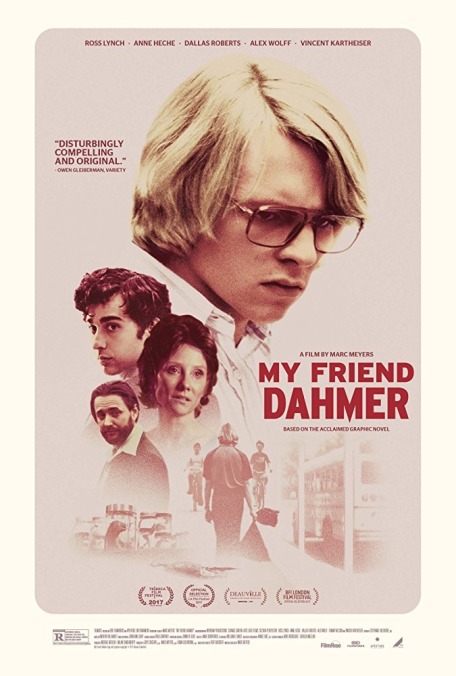Of course, the weird kid at most high schools doesn’t go on to become a cannibalistic serial killer. And while many movies have toyed with the idea of a sympathetic monster, those are usually strictly within the realm of fiction. But to Cleveland-based cartoonist John “Derf” Backderf, Jeffrey Dahmer was the weird kid at his high school. Backderf later translated his memories of going to school with, and briefly befriending, Dahmer into the graphic-novel memoir My Friend Dahmer, which forms the basis for the film (with a few tweaks, including an increased focus on Jeffrey’s home life).
Director Marc Meyers aims for a similar verisimilitude in the look of the film, shooting in the actual house where Dahmer lived as a teenager and filling the film’s soundtrack with songs pulled from contemporary playlists on the local FM rock station. This technique does give the film a very specific sense of time and place—small town Bath, Ohio, 1978—and the characters of Derf (Alex Wolff) and his National Lampoon– and Monty Python-obsessed crew of teenage comedy nerds are much more specific and realistic than most cinematic high schoolers. At the beginning of the film, Derf and his friends adopt creepy loner Dahmer as the “mascot” of their group, pushing him to participate in increasingly outlandish pranks (some of which are quite funny, in a juvenile sort of way). Dahmer, a sociopath who lacks fear, shame, and social skills, takes this tiny morsel of acceptance and pushes it to its limit.
But where Derf and his buddies are specific, Dahmer himself—played by 21-year-old Disney Channel star and boy-band singer Ross Lynch—is more elusive. Lynch plays the disturbed teenager as a brooding hulk, silently keeping secret his homosexuality, as well as the violent urges that become stronger with every social rejection and frustrated crush. At times, Meyers and Lynch bring a sensitivity to the character that gives little moments impressive weight, like Jeffrey taking the family dog out to the woods behind his house or flinching under the cold stethoscope of handsome Dr. Matthews (Vincent Kartheiser), who Jeffrey silently watches from the bushes on the former’s daily jog. At other times, the character seems like a sloped-shouldered, unsmiling cipher. But considering that much of what we know about Dahmer’s adolescence comes from Dahmer’s jailhouse interviews, perhaps a bit of shallow affect is forgivable.
It’s another portrayal of mental illness that keeps My Friend Dahmer from fully immersing viewers in its reality, however. Dallas Roberts is believably exasperated as Jeffrey’s worried father, who attempts in vain to make up for years of burying himself in his work when he recognizes dark personality traits in his son. (There’s the intense interest in roadkill, and the violent temper, and…) Anne Heche, on the other hand, goes way over the top as Jeffrey’s mother, Joyce, whose emotional instability keeps her cycling in and out of mental hospitals. She delivers the film’s most groan-worthy line: “In this house, we eat our mistakes.” Heche is going for impactful, but overshoots and lands in Jerri Blank territory more than once over the course of the film.
All this family drama takes away from the film’s provocative core question: If there had been someone in Jeffrey Dahmer’s life who could have helped him channel his impulses, particularly the sexual ones, into something healthier, would he have killed anyone at all? My Friend Dahmer asks this question without indulging in any explicit violence or sex, leaving the horror to unfold entirely in the viewer’s mind—and conscience. It’s a clever move on Meyers’ part, appealing to the audience’s humanity in a character study of a man many would call inhuman. Jeffrey Dahmer was a real person, with a family and at least a couple of casual friends. The people he killed were, too. The discomfort of reconciling those two facts is where this film lives, and what ultimately makes it work.


 Keep scrolling for more great stories from The A.V. Club.
Keep scrolling for more great stories from The A.V. Club.